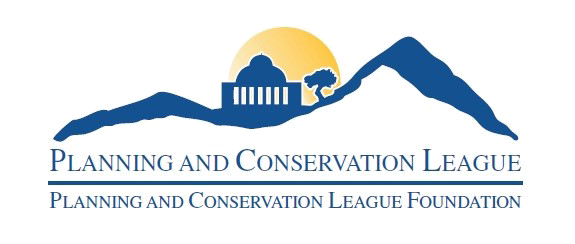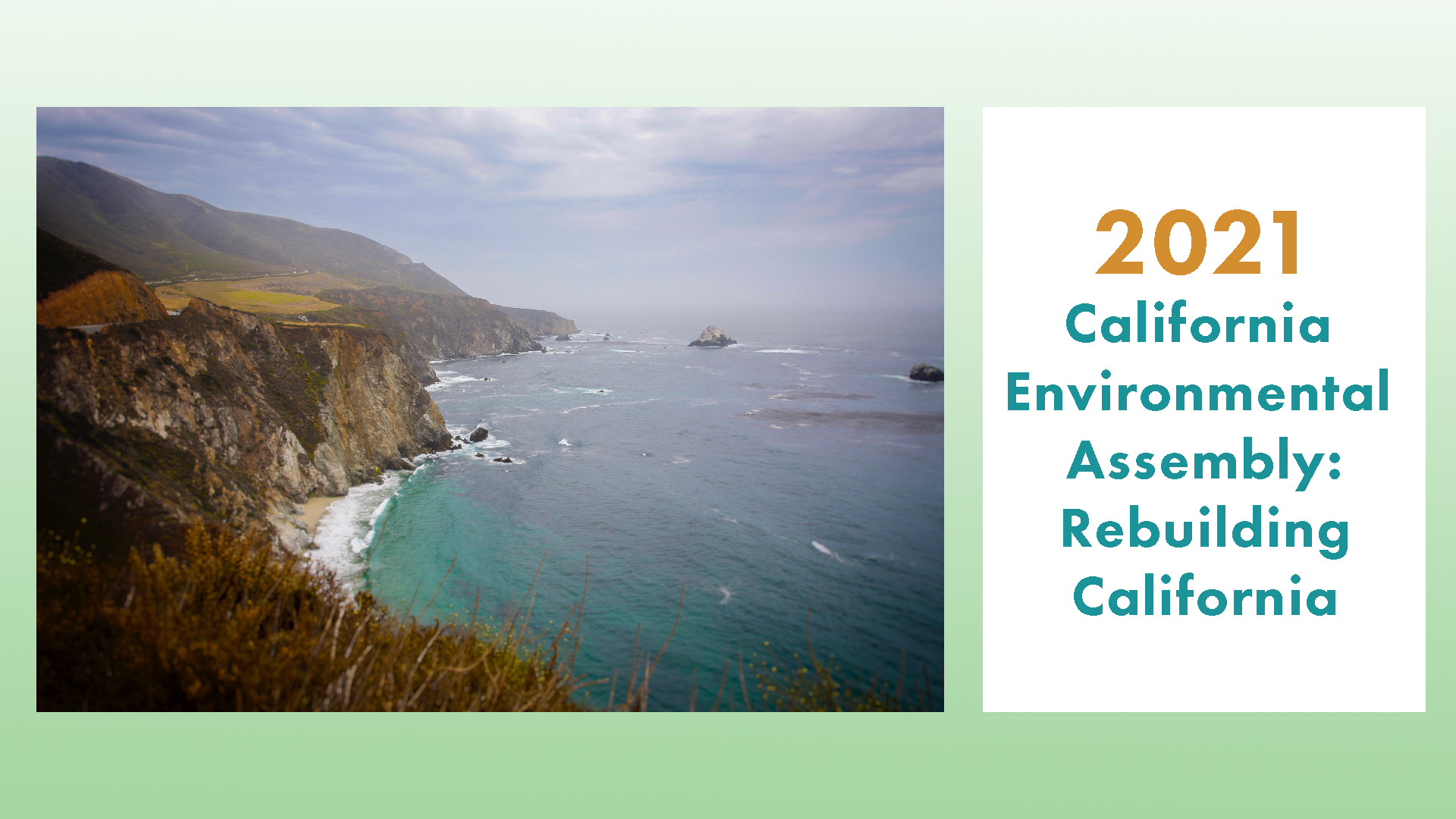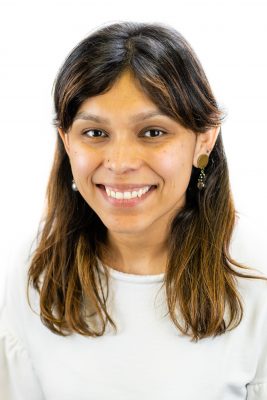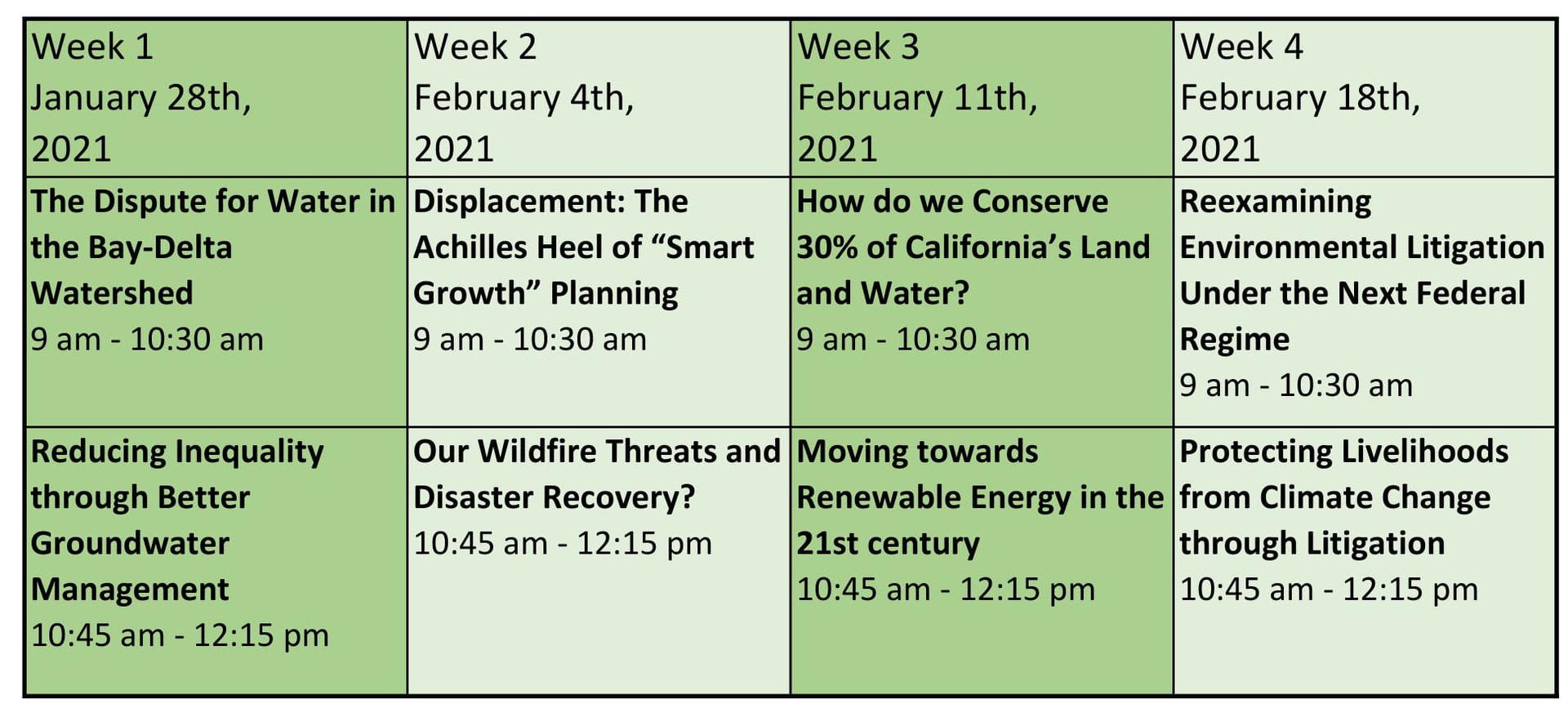
Introducing the Water Webinars!
January 28th, 2021
The Dispute for Water in the Bay-Delta Watershed
9:00 am – 10:30 am
The allocation of water in the Bay-Delta Watershed has been a long disputed topic. Under the Clean Water Act, the state is required to develop a plan for how much water is to remain in the watershed and how much is to be allocated and to update this plan every three years. However, the Bay-Delta Water Quality Control plan has not been substantially updated since 1995 – over 25 years ago. In the 2020 Water Resilience Portfolio, Governor Newsom set a state goal not to update the plan but rather to focus on developing voluntary agreements. These agreements would be developed by the water rights users, mainly water districts, in which they would agree to use a certain amount of water from the watershed. Unlike a Water Quality Control Plan, which starts by identifying how much water is in the delta and how much should remain in the ecosystem, voluntary agreements would focus on the needs of water users first. This session would discuss the problems with using voluntary agreements to regulate water use and strategies on how to convince the Newsom administration to focus on updating the Water Quality Control Plan.
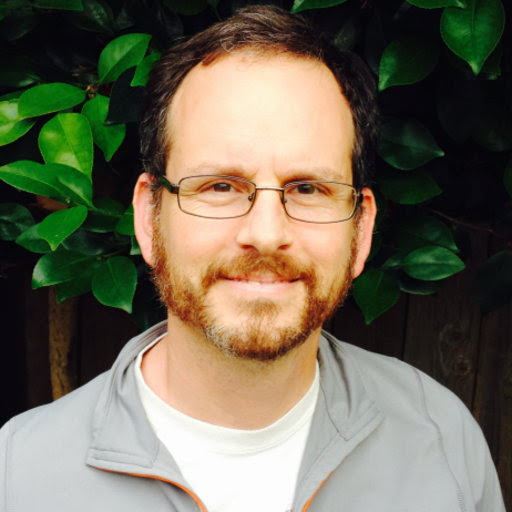
Panelist
Senior Scientist
San Francisco Baykeeper
Jon Rosenfield is the senior scientist at the San Francisco Baykeeper. Jon first went to the Bay Area in 1991 to work for the Sierra Club Legal Defense Fund (now Earthjustice), where he fell in love with Pacific salmon, including the Chinook and Steelhead that migrate through the Bay on their way to and from spawning grounds in the Central Valley. Jon worked with The Bay Institute for over 10 years, protecting the Bay’s endangered fish and commercial fisheries and collaborating closely with Baykeeper staff during that time.
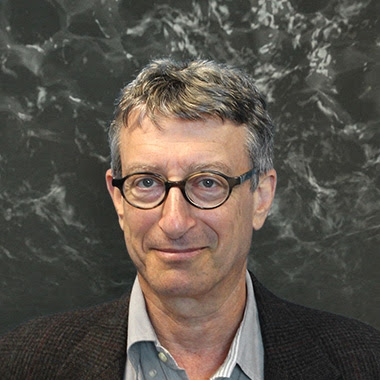
Panelist
Gary Bobker
Director
The Bay Institute
Gary Bobker joined The Bay Institute in 1992. Since then, he has helped negotiate several landmark environmental agreements, from the Bay-Delta Accord to the San Joaquin River restoration settlement. Bobker currently directs The Bay Institute’s Rivers and Delta Program, which works to enforce and strengthen baseline environmental protections for the estuary, provide guidance and oversight to long-term restoration plans and projects, and reform Central Valley water use and agricultural drainage management.
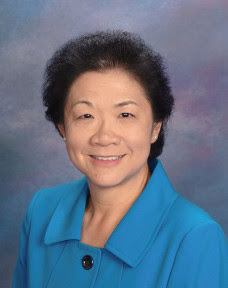
Panelist
Board Member
California State Water Resources Control Board
Tam Doduc serves as the civil engineer on the State Water Resources Control Board. Ms. Doduc most recently served as Deputy Secretary at the California Environmental Protection Agency (Cal/EPA), where she directed the agency’s environmental justice and external scientific peer review activities. She also coordinated various environmental quality initiatives and provided general oversight of children’s environmental health programs.

Panelist
Rachel Zwillinger
Water Policy Advisor
Defenders of Wildlife
As the Water Policy Advisor for Defenders’ California Program, Rachel focuses on protecting the fish and wildlife that depend upon California’s waterways and wetlands. Among other priorities, she works to ensure that wetlands in the Central Valley receive sufficient water to support birds as they migrate along the Pacific Flyway, and strives to protect endangered salmon and other native species that depend upon the San Francisco Bay-Delta and upstream habitats.
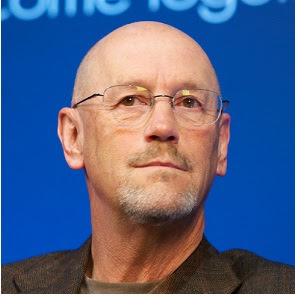
Moderator
Senior Water Policy Advisor
Planning and Conservation League
Jonas Minton became a member of the PCL team in 2004 to work on issues surrounding water use and water policy issues. Jonas is the former Deputy Director of the California Department of Water Resources where he was responsible for overseeing the Divisions of Planning, Local Assistance, Flood Management, Dam Safety, Water Conservation, and Water Transfers. Mr. Minton managed the update to the State Water Plan, the Floodplain Management Task Force, the Recycled Water Task Force, and the Desalination Task Force.
Reducing Inequality through Better Groundwater Management
10:45 am – 12:15 pm
Water and inequality are closely tied together as water allocation and scarcity is a strong factor in maintaining inequality. This is particularly true for groundwater as this resource is particularly rare and is a necessity for communities living far from bodies of fresh water. Current groundwater management strategies rarely focus on managing groundwater in a way that protects the interests of disadvantaged groups and the environment. This session will focus on identifying the lapses in current management methodology and offer solutions on how to better manage groundwater with all interests in mind.
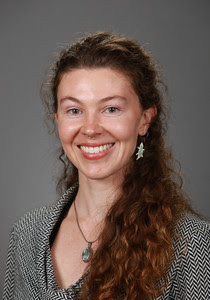
Panelist
Policy Advocate
Community Water Center
Justine Massey originally joined Community Water Center as the 2018 legal intern and returned in 2020. As Policy Advocate, she focuses on policies and community engagement related to sustainable groundwater management. Justine holds a B.A. in Visual Arts from Stanford University and a Certificate in Visual Production from the Universidad Nacional de las Artes in Argentina. She completed her law degree at UC Davis School of Law and received an Environmental Law Certificate.
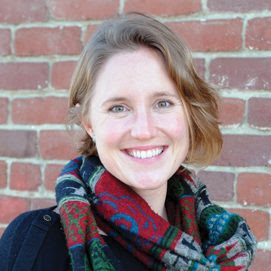
Panelist
Amanda Monaco
Water Policy Coordinator
Leadership Counsel for Justice and Accountability
Amanda works as a Policy Coordinator – Water Programs and helps communities organize and fight for their rights to equitable access to drinking water and wastewater services and sustainable groundwater management. She is from Gainesville, Florida, and attended the University of Florida, where she got her B.A. in Political Science and also studied Latin American Studies, Sustainability Studies, and Anthropology. She received her J.D. from Georgetown University Law Center in Washington, D.C., where she studied human rights, environmental, corporate, and trade law.
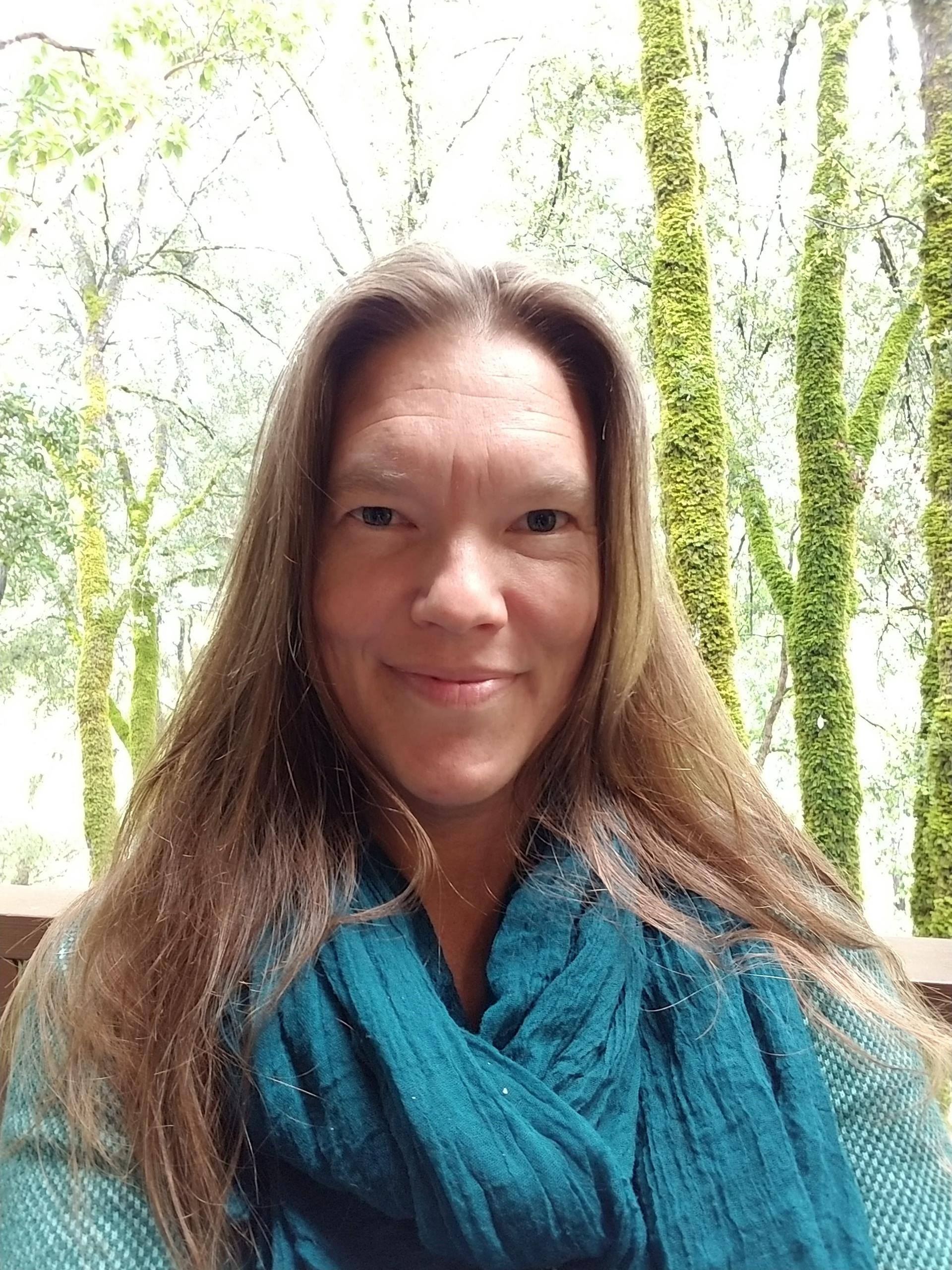
Panelist
Water Quality Program Manager
Karuk Tribe Department of Natural Resources
Susan Fricke is the Water Quality Program Manager for the Karuk Tribe Department of Natural Resources. She has a BS in Biology from Kansas State University, an MS in Natural Resources/Fisheries from Humboldt State University, and has worked in Natural Resources monitoring, research, and management for 20 years. She facilitates the use of Tribal data and Traditional Ecological Knowledge being adopted into tribal, state, and federal policy. With her staff in the Karuk Tribe’s Water Quality Program, they conduct monitoring and research on over 130 miles of River for long-term water quality trends, seasonal dynamics, fish disease, and HABs.
Panelist
Community Development Specialist
Self-Help Enterprises
Angela Islas is a Community Development Specialist with Self Help Enterprises (SHE). Angela works in the Community Engagement and Planning team, which works to support community participation in regional water management and groundwater sustainability planning for the Northern San Joaquin Valley. Before joining SHE, Angela held a position as a policy advocate and community health worker for a local air quality nonprofit in Fresno, CA advocating for robust air quality, public health, and energy policies, providing a free asthma education service for low-income families in Fresno, Madera Counties, and facilitating, supporting the first collaborative air quality steering committee for the Community Air Protection Program under California Air Resources Board (CARB).
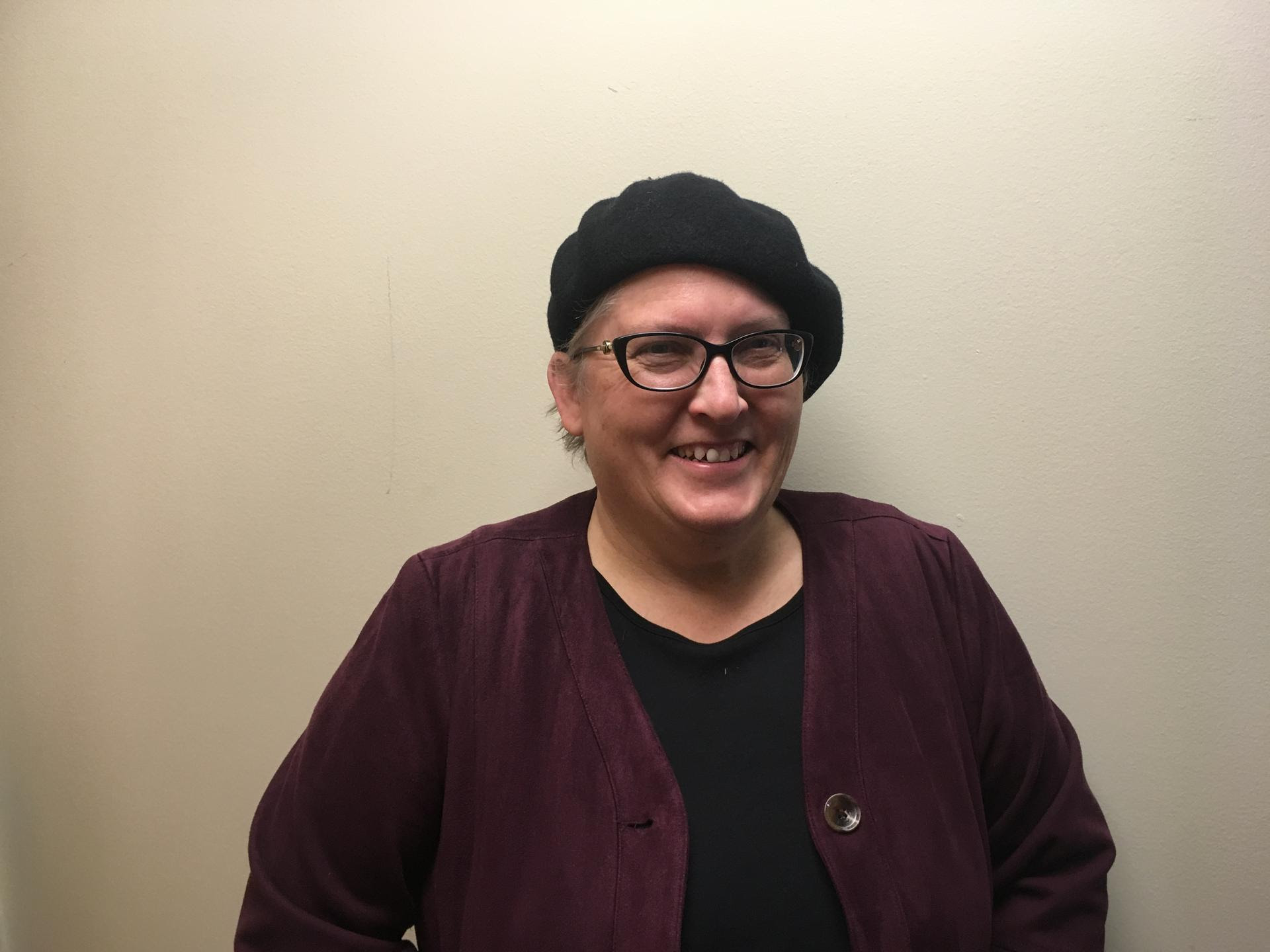
Moderator
California Director
Clean Water Action
Jennifer is the California Director. Before taking on the role of State Director, Jennifer served as a water policy and legislative analyst. Prior to joining Clean Water Action, Jennifer worked in the private sector, including a stint as a San Francisco tour guide, and advocated on environmental issues in San Francisco. She holds a bachelor’s degree in Chemistry from U.C. Berkeley.

